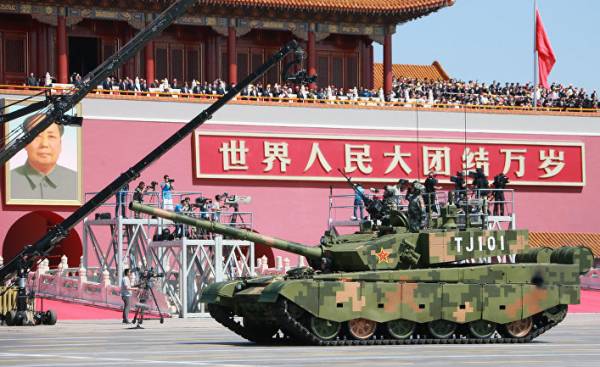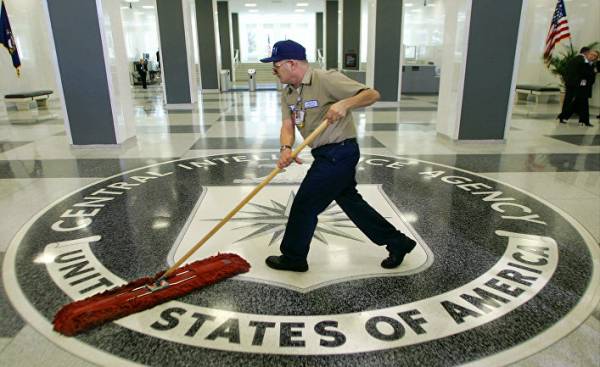
Washington — since 2010, the Chinese government systematically interfered with intelligence operations by the CIA in this country, killing and jailing more than a dozen informants in just two years, and prevented the gathering of intelligence in later years.
Current and former us officials called the loss of the most significant intelligence over the past few decades. Intelligence and law enforcement agencies of Washington struggled trying to cope with the negative consequences, but in the process they had serious disagreements. Some were convinced that the US betrayed a CIA agent. Others felt that the Chinese managed to hack into the CIA system, which was used for communication with foreign informants of this Agency. It’s been a few years, but this debate continues.
However, the issue of damages all share the same opinion. According to former American officials, from late 2010 until the end of 2012, the Chinese have killed at least a dozen informants for the CIA. According to three officials, one of them shot dead in front of his colleagues in the courtyard of a government building — this should have been a clear signal to other informants working for the CIA.
The other informants were in prison. According to former senior U.S. officials, the Chinese killed and sent to jail from 18 to 20 informants of the CIA, crippling the network, the creation of which lasted for many years.
To assess the consequences of disrupted intelligence operations is difficult, but it is believed that this episode has turned extremely serious damage. According to officials, the number of American sources, lost in China, comparable to the number of agents of the United States lost to the Soviet Union and Russia as a result of the betrayal of a former CIA official Aldrich Ames (Aldrich Ames) and the former employee of FBI Robert Hanssen (Robert Hanssen), who passed information to Moscow for years.
This episode, which previously nothing was reported, proves how successfully the Chinese disrupted the operations of us intelligence services and stealing American secrets even before the hacker attacks in 2015, which was widely reported in the media and as a result of which Beijing got access to data of employees of government agencies, including intelligence officers. The CIA considers espionage operations in China as one of its priorities, but an extensive apparatus of the Chinese security services makes the task of recruiting informants in this country extremely difficult.
While the CIA is trying to figure out how two months ago it extremely secret documents in the hands of the leadership of Wikileaks, which published them on the Internet, and the FBI is investigating possible links between associates of the President trump and Russia, the lack of results in the Chinese investigation demonstrates the difficulties associated counterintelligence operations inside spy agencies, such as Russia and China.
Representatives of the CIA and the FBI refused to comment on the situation.
Details of this investigation, known only to a narrow circle of officials. Ten current and former American officials agreed to talk about the investigation on condition of anonymity.
The first signs of the problems appeared in 2010. While the quality of the information about the internal mechanisms of the Chinese government, which received the CIA, was the highest in many years. According to four former U.S. officials, this was possible due to the fact that the CIA managed to recruit informants inside the bureaucracy of Beijing. Some of the informants were citizens of China, which was believed by the CIA, was disappointed in the Chinese government, mired in corruption.
By the end of 2010, the flow of information began to wane. By early 2011, a senior CIA officers realized that they faced a serious problem: their informants in China is one of the most valuable resources — began to disappear.
The CIA and the FBI began a joint investigation, which was led by senior counterintelligence officers in both agencies. Working in a secret office in Northern Virginia, they began to analyze in detail all their operations in Beijing. According to one former us official, the investigation was codenamed “honey Badger”.
As soon as he lost more and more informants, this operation took on increasing importance. Almost every employee of the American Embassy have been thoroughly inspected no matter how high position he held. Some experts believed that the Chinese managed to break the encryption that the CIA used to communicate with their informants. Others suspected that the CIA operates within an embedded agent — initially, the officials of the Agency did not want to believe it, and some still continue to reject this theory.
Their disputes were accompanied by an unexpected phone call in which he reported the loss of another informant, as well as urgent requests from the administration of President Barack Obama on why data on Chinese began to arrive less frequently.
Searches the embedded agent in the end led to one former CIA officer who worked in the Department dealing with operations in China. Officials believed that this person could convey to the Chinese side secret information. However, attempts to collect the evidence to arrest him, nor to no avail, and now, according to officials, the man lives in another Asian country.
According to the former officials, then they have good reason to suspect someone on the inside. Around the same time, the Chinese spies have uncovered the residency of the national security Agency of the USA on Taiwan. And the CIA found Chinese agents in its structure, as evidenced by court documents.
Meanwhile, according to officials, mark Kelton (Kelton Mark) that the CIA is responsible for counter-intelligence, at first did not support the theory of the embedded agent. Mr. Kelton was a close friend of Brian Kelly (Brian J. Kelley) is a CIA officer who in the 1990-ies wrongly suspected of espionage in favor of Russia. Then it turned out that the real traitor was Mr. Hanssen. Mr. Kelton was often mentioned the accusations against Mr. Kelly during the Chinese episode and said that he will not to accuse anyone without having conclusive evidence.
Those officers who rejected the theory introduced by the agent, explained the loss by negligence of U.S. intelligence agents in the period when the Chinese have improved their methods of monitoring spying on US in China. According to FBI agents, informants, CIA in Beijing too often used the same travel routes and meeting points, which helped the agents of Chinese intelligence services to identify spies.
 © AP Photo, J. Scott ApplewhiteШтаб-apartment of the CIA in Langley, Virginia
© AP Photo, J. Scott ApplewhiteШтаб-apartment of the CIA in Langley, Virginia
Some officers met with their sources in the restaurant, where the agents of Chinese intelligence services pre-installed listening devices and where the waiters also worked for Chinese intelligence.
This negligence, combined with the assumption that the Chinese have hacked into a secure network, explains many, if not all, of the disappearance and death of agents. However, some in the us intelligence community, especially those who helped to create this spy network, refuted this theory and believed that spies were caught because of the intrigue within the CIA.
However, the Chinese continued to eliminate informants during 2011 and 2012. As you narrow the list of suspects who had access to information, investigators are focusing on the Chinese-American, who left the CIA shortly before the moment when intelligence began to incur losses. According to some investigators, something would cause his displeasure, and he could start spying in favor of China. According to one official, this man had access to lists of informants of the CIA.
After leaving the ranks of the CIA, this man decided to stay in Asia together with family and to do business, which, as some suspect officials, Chinese intelligence has helped him to organize.
According to officials, in 2012, the FBI and the CIA persuaded the man to return to the United States, inviting him to enter into a contract with the Agency, as often happens with the former officers. Agents of these services questioned him, trying to figure out what reasons made him stay in Asia, suspecting that he knew the secrets that could be of interest to the Chinese. It is unclear, did the agents ask the man about whether he was spying in favor of China.
According to officials, the man convincingly explained the reasons why he decided to stay in Asia, and refused to recognize any guilt. He then returned to Asia.
By 2013, the FBI and the CIA came to the conclusion that for some reason, the success of China in search of the informants the CIA has subsided, but the damage had already been done.
The CIA tried to rebuild their network of informants in China — a costly and lengthy operation, which at one time was headed by the former head of the East Asia Department. According to a former intelligence official, the former Manager was particularly upset because he was working with a man suspected of spying for China, and he recruited informants in China, which in the end killed.
In the last few years China has been acting particularly aggressive in its espionage operations, and this applies not only to the hacking attack on the personnel Management system in 2015. Last year, one FBI agent pleaded guilty to that in a few years he was spying in favor of China, Beijing transmitting secret information in exchange for cash, rooms in luxury hotels during trips abroad and prostitutes.
In March the Prosecutor’s office announced the arrest of an employee of the Department of state Candace Clayborne (Claiborne Candace Marie), which was charged with giving false testimony regarding her contacts with Chinese officials. According to the lawsuit against Ms. Claiborne, who pleaded not guilty, the Chinese agents had transferred money to her Bank account and gave her various gifts, including an iPhone, laptop and paid courses. In addition, she received a fully furnished apartment and a regular allowance.







